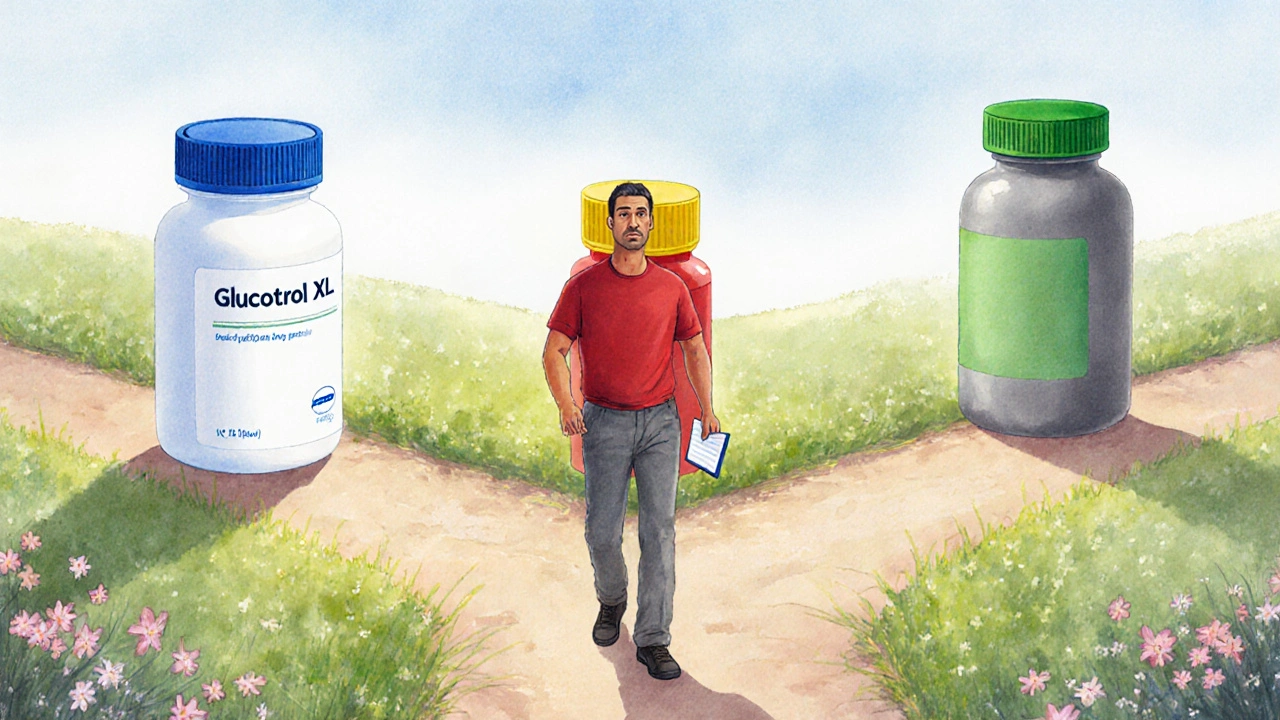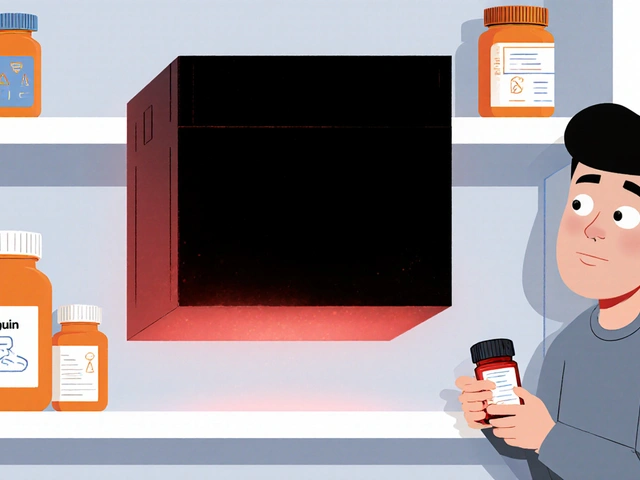Diabetes Medication Comparison Tool
Enter your preferences to compare diabetes medications based on key factors.
Glucotrol XL is a tablet‑based version of the sulfonylurea glipizide, prescribed to lower blood sugar in people with type 2 diabetes. If you’re weighing it against other options, you need clear facts, not marketing fluff. Below is a quick snapshot, then a deeper dive into how glipizide stacks up against the most common alternatives.
- Glucotrol XL works fast, but may cause low blood sugar more often than newer agents.
- Metformin is first‑line, cheap, and weight‑neutral.
- Glyburide and glimepiride are cheaper sulfonylureas with a longer half‑life.
- Sitagliptin, canagliflozin, and liraglutide offer lower hypoglycemia risk but cost more.
- Choosing depends on price, side‑effect tolerance, kidney function, and personal goals.
What Is Glucotrol XL (Glipizide)?
When you first see the name, you might wonder why a brand name matters. Glucotrol XL is a once‑daily extended‑release tablet of glipizide, a second‑generation sulfonylurea. It stimulates the pancreas to release more insulin, lowering fasting glucose and A1C by roughly 1‑2%.
Key attributes:
- Typical dose: 5mg to 20mg once daily.
- Onset: 30‑60minutes; peak effect 4‑6hours.
- Half‑life: 2‑4hours, but extended‑release prolongs action.
- Common side effects: hypoglycemia, nausea, weight gain.
How Glipizide Works - The Sulfonylurea Mechanism
Glipizide belongs to the Sulfonylurea class, drugs that bind to ATP‑sensitive potassium channels on β‑cells. This binding closes the channel, triggers calcium influx, and forces the cell to release insulin regardless of blood‑sugar levels. The result is a rapid insulin surge, which is great for post‑meal spikes but can overshoot, leading to hypoglycemia.
The same mechanism powers older sulfonylureas like glyburide and glimepiride, but glipizide tends to have a shorter duration, making the hypoglycemia risk a bit more manageable for some patients.
Alternatives Worth Considering
Below are the most common oral and injectable drugs that doctors often line up against glipizide.
- Metformin - a biguanide that reduces hepatic glucose production; first‑line for most patients.
- Glyburide - another sulfonylurea, longer‑acting than glipizide.
- Glimepiride - sulfonylurea with a slightly lower hypoglycemia profile.
- Sitagliptin - DPP‑4 inhibitor; modest A1C drop, low hypoglycemia risk.
- Canagliflozin - SGLT2 inhibitor; lowers glucose via urine, offers weight loss and blood‑pressure benefits.
- Liraglutide - GLP‑1 receptor agonist; injectable, strong A1C reduction, weight loss, but higher cost.
Decision Criteria: What to Compare
When you sit down with your doctor, ask yourself these points. Each criterion links directly to a major attribute of the drugs listed above.
- Efficacy (A1C reduction) - How much will the drug lower your A1C?
- Hypoglycemia risk - Does the drug cause low blood sugar?
- Weight impact - Does it cause weight gain, loss, or neutral?
- Kidney safety - Can you take it if you have reduced eGFR?
- Cost & insurance coverage - Is it affordable out‑of‑pocket?
- Convenience - Daily pill, weekly injection, or dietary restrictions?

Comparison Table
| Drug | A1C ↓ (avg.) | Hypoglycemia | Weight Effect | Kidney Use | Typical Cost (US) |
|---|---|---|---|---|---|
| Glucotrol XL (glipizide) | 1‑2% | Medium‑High | Gain 1‑3lb | OK if eGFR >30mL/min | $4‑$10 per month (generic) |
| Metformin | 1‑1.5% | Low | Neutral or loss | Contraindicated <30mL/min | $4‑$12 per month |
| Glyburide | 1‑1.5% | High | Gain 2‑4lb | OK if eGFR >30mL/min | $3‑$8 per month |
| Glimepiride | 1‑1.5% | Medium | Gain 1‑2lb | OK if eGFR >30mL/min | $5‑$12 per month |
| Sitagliptin | 0.5‑0.8% | Low | Neutral | Safe down to eGFR 30mL/min | $150‑$200 per month |
| Canagliflozin | 0.6‑1.0% | Low | Loss 2‑4lb | Not for eGFR <30mL/min | $250‑$300 per month |
| Liraglutide | 1‑1.5% | Very Low | Loss 5‑10lb | Safe with eGFR >30mL/min | $600‑$800 per month |
Who Might Prefer Glucotrol XL?
If you’re on a tight budget, need a single‑pill daily regimen, and have a relatively intact pancreas, glipizide can be a solid bridge before you graduate to newer agents. It shines for patients who:
- Prefer generic drugs with low out‑of‑pocket cost.
- Have mild‑to‑moderate kidney function (eGFR >30mL/min).
- Don’t mind a possible modest weight gain.
- Can monitor blood sugar closely to catch hypoglycemia early.
However, if you’ve experienced frequent lows, are overweight, or have cardiovascular concerns, a drug like canagliflozin or liraglutide might align better with your goals.
Safety, Side Effects, and Drug Interactions
Glipizide’s main safety red flag is hypoglycemia, especially when combined with alcohol, beta‑blockers, or other insulin‑secretagogues. It also interacts with CYP2C9 inhibitors (e.g., fluconazole) which can raise plasma levels.
Most alternatives have their own warnings: metformin can cause GI upset and lactic acidosis in severe renal impairment; SGLT2 inhibitors carry a risk of genital infections; GLP‑1 agonists may trigger pancreatitis. Knowing the trade‑offs helps you avoid surprises.
Cost Snapshot and Insurance Tips
Glucotrol XL’s generic price sits around $4‑$10 per month, making it one of the cheapest options. In contrast, sitagliptin costs roughly $150‑$200, canagliflozin $250‑$300, and liraglutide tops $600. Insurance formularies often place sulfonylureas at Tier1, while newer agents sit in higher tiers with prior‑auth requirements.
Ask your pharmacist about coupons, manufacturer patient‑assistance programs, or 90‑day refill discounts. Sometimes a small co‑pay boost for a newer drug pays off in fewer doctor visits due to fewer side effects.
Bottom Line: Making the Choice
There’s no one‑size‑fits‑all answer. If you value affordability and can handle occasional low blood sugars, Glucotrol XL remains a viable option. If you prioritize weight loss, cardiovascular protection, or have a history of hypoglycemia, look toward metformin‑based combos, SGLT2 inhibitors, or GLP‑1 agonists.
Talk openly with your endocrinologist, bring your blood‑sugar logs, and weigh the cost‑vs‑benefit picture. The right drug will keep your A1C in range, fit your lifestyle, and stay within your budget.

Frequently Asked Questions
Can I switch from Glucotrol XL to Metformin?
Yes. Most doctors start with Metformin because it’s weight‑neutral and low‑cost. You’ll usually taper off glipizide over a week while titrating Metformin to avoid gaps in glucose control.
Why does Glucotrol XL cause weight gain?
Sulfonylureas boost insulin, which promotes fat storage. The gain is modest (1‑3lb) but can add up if you’re already overweight.
Is glipizide safe for people with kidney disease?
It’s generally safe if eGFR is above 30mL/min. Below that, the drug can accumulate and raise hypoglycemia risk, so doctors usually switch to non‑secretagogue options.
How does the cost of Glucotrol XL compare to brand‑name SGLT2 inhibitors?
Glucotrol XL’s generic price is under $10 a month, while SGLT2 inhibitors like canagliflozin often exceed $250. The price gap can be a deciding factor for many patients.
Do I need to monitor blood sugar more often on Glucotrol XL?
Because hypoglycemia risk is medium‑high, checking fasting glucose daily (or before meals) for the first few weeks helps you learn how your body reacts.






JOANNA WHITE
September 30, 2025 AT 01:27Glucotrol XL is still a solid choice if you're on a budget and your pancreas is still kicking. I’ve been on it for 3 years-yes, I get low blood sugar sometimes, but I keep glucose tabs in my purse and my coffee mug. No drama. Just real life.
Metformin? Sure, it’s cheaper and doesn’t make you gain weight, but my stomach felt like it was hosting a rock concert every morning. Glipizide didn’t do that. Trade-offs, people.
Frederick Staal
October 1, 2025 AT 20:01Let’s be real-this whole ‘sulfonylurea vs. SGLT2’ debate is just pharmaceutical marketing dressed up as medical advice. Glipizide has been around since the 80s. It works. It’s cheap. It doesn’t come with a 12-page warning leaflet about diabetic ketoacidosis or genital yeast infections.
Meanwhile, the new drugs are basically expensive insulin boosters with side effects that read like a horror novel. If you’re not bankrupt or in a clinical trial, why are you even considering them? The system wants you to believe you need the latest thing. You don’t.
erin orina
October 3, 2025 AT 07:17Hi! Just wanted to say I totally get it-glipizide can be scary at first with the lows 😅
I started on it last year and was terrified, but I learned to eat a little snack before bed and check my sugar before driving. Now I feel so much more in control. You’re not alone!! 💪❤️
Also, if you’re worried about weight gain, I lost 5 lbs just by cutting out sugary drinks. Small wins add up!
Lisa Uhlyarik
October 4, 2025 AT 04:04Everyone’s obsessed with cost but nobody talks about dignity
Do you really want to be the person who takes the drug that’s been around since Nixon was president because it’s cheap
Or do you want to invest in something that actually treats the disease not just the number
Metformin is fine for people who still have insulin sensitivity
But if your pancreas is tired you’re just delaying the inevitable
And now you’re on insulin anyway
Why not skip the middleman and go straight to something that helps your heart too
It’s not about money it’s about living longer than your parents
Cameron Perry
October 5, 2025 AT 18:31Wait so if Glucotrol XL is $4/month and canagliflozin is $600, why do so many docs push the expensive stuff? Is it just because they get kickbacks or do they actually think it’s better for everyone?
I’m asking because my doc just switched me to sitagliptin and I’m confused. I don’t have insurance and I’m barely scraping by. This feels like a trap.
Kelley Akers
October 6, 2025 AT 02:19How is anyone still using sulfonylureas in 2025? It’s like driving a 1998 Corolla while everyone else is in Teslas.
Glipizide causes hypoglycemia, weight gain, and doesn’t protect your heart. Meanwhile, SGLT2 inhibitors reduce heart failure hospitalizations and GLP-1s help you lose weight and lower your blood pressure.
Yes, they’re expensive-but so is a heart attack. Or dialysis. Or losing a toe.
If you can’t afford the newer drugs, you’re not poor-you’re being exploited by a broken system. But don’t pretend you’re making a smart medical choice. You’re just surviving.
Peggy Cai
October 7, 2025 AT 03:06Why do we even talk about drugs like they’re the solution
Diabetes isn’t a pill problem it’s a life problem
You take Glucotrol XL and you still eat the same bread
You take canagliflozin and you still sit all day
Nobody wants to say it but the real treatment is not a prescription
It’s stopping the sugar
It’s walking
It’s sleeping
It’s not pretending medicine can fix what your choices broke
And if you think a $10 pill is the answer
You haven’t really been paying attention